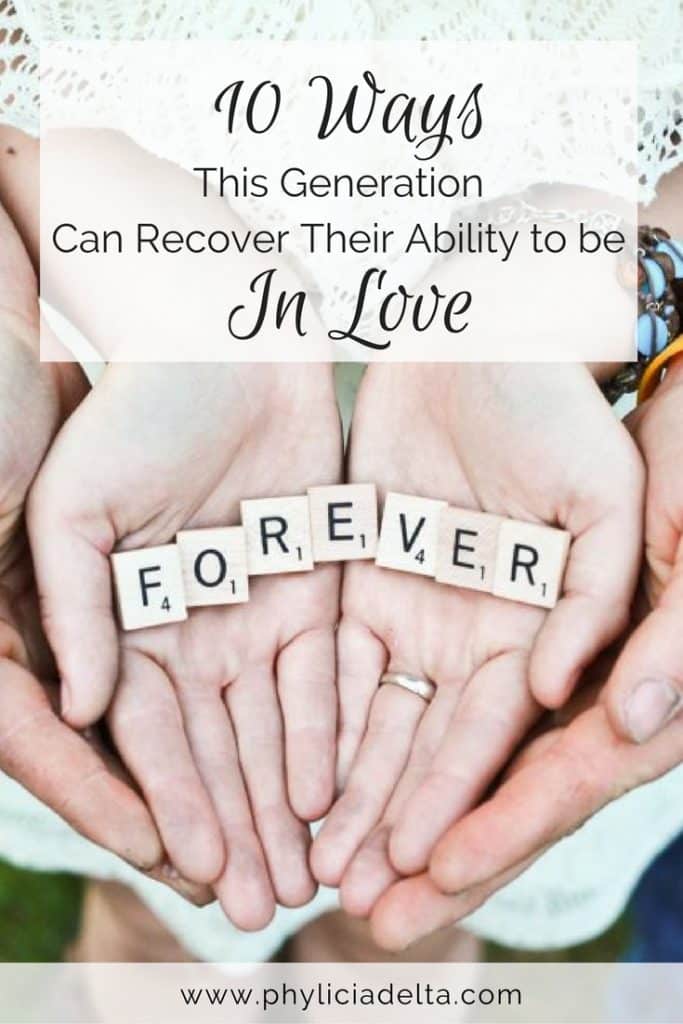If you cruise through social media I think you’ll agree that love – the kind of Andy Griffith shows and your great-grandparents – is seen as unrealistic and “fake”. Today’s #relationshipgoals are more about appearance than substance. We admire the adventurous, exotic, and beautiful, and miss the mundane that makes up most lasting relationships – and there are consequences.
When Paul Hudson wrote this piece for Elite Daily, I was immediately intrigued. He zeroed in on an issue I’ve long lamented in my generation. We, the thirty- and twenty-somethings, have lost our ability to love.
Imagine a man taking a girl on a real date, the kind with pulled-out chairs, starry eyes and a covered check, and “wanna hang in the computer lab?” pales in comparison. Imagine a girl really responding to masculine initiative and chivalry, instead of scorning it in the name of “independence”. These things don’t happen as much for our generation, and it’s all because of our worldview. It’s all a product of the lives we’ve chosen to live.
I could articulate why I think we’ve reached this place but I already have. Let’s talk instead about how to fix this problem. There is a solution, but it requires an understanding of what love really is. Our culture may have lost its ability to love, but we as Christians can recover it. Here’s how.
Understand the eternal nature of love.
Elite Daily is right: our generation does place priority on instant gratification, and it’s ruining our love lives. Love, by its very nature, requires time to incubate and grow. That thing you feel “at first sight” – it’s not love, it’s attraction. Love develops when that attraction gives way to a deep, lasting knowledge of a whole person.
Love by nature is eternal, and that’s why marriage is such a big deal in God’s eyes. It’s why sex – the physical expression of eternal love – is protected by the marriage covenant. God is love: The everlasting definition of it. Our culture has removed Him from every aspect of relationships, especially sex, so it is no surprise that love has become temporal and unsatisfactory. Love doesn’t happen in a moment, and anyone who understands it wouldn’t want it to. Love is the slow build of brick-on-brick communion between two eternal souls. Anything less isn’t love at all.
Live with obvious consecration.
Hudson’s article pointed to the culture of “drugs and booze” as a love deterrant. This is true even for Christians. Quite simply, if you’re a Christian looking for a Christian mate, your personal lifestyle is a reflection of the kind of relationship you’ll have. If your faith doesn’t influence your media choices, where you hang out, and who you hang out with, “Christian” is just a bumper sticker on your religious rental car. It’s not who you are.
If you want to find lasting love, start by embracing the love of Christ – and then live up to it. Christians are called to live with obvious consecration. That means being set apart; being different. It means discerning what is coarse, crude, and ungodly from what is pure, good, and right. It means refusing to settle. It means living up to what Christ did for you because you love Him for it. When you understand love on a spiritual level, you’ll understand it on the personal level as well.
Embrace the true meaning of commitment.
Love, to God, is all about covenant. Without the covenant, the word love has no meaning – it’s just a pretty word. Anywhere we see God showing love to mankind in Scripture it is followed by commitment and action. That’s our blueprint for human relationships.
Elite Daily pointed out that our culture sleeps around – a lot. Unfortunately, even Christians live this way. Because they’ve swallowed the lie that love can exist apart from commitment, relationships quickly spiral into nothing more than a physical partnership. When God required marriage to participate in sex, it wasn’t because He thinks it’s dirty, bad, or evil – to the contrary, He created it! God requires commitment because sex affects our entire person. With such power, sex can destroy us if used outside its design – and that’s exactly what it does. But when sex is treated with the value it deserves, it becomes a source of complete physical fulfillment, emotional security, and spiritual oneness.
Read More: Why God Requires Marriage For Sex
Stop seeking love for your own fulfillment.
Because my blog primarily deals with sex and relationships, I get a lot of emails from single women. Most of them contain the same appeal: When will I finally have a good relationship?
The desire for relationship is not wrong. God is a relational God and we are relational people. But when we start idolize relationships, we’ve missed their entire point. We can’t guarantee that anyone will satisfy us completely; in fact, we can guarantee that they won’t! If you go into dating or marriage expecting your partner to make you completely and utterly happy, you’ll be disappointed. But if you go into it expecting to give everything you have with the selfless love of God, you’ll have fulfilled your purpose, regardless of how your partner responds. Love should be sought for the giving, not receiving, but the beautiful thing about it is that by giving, we very often receive the fulfillment we wanted at first.

Date with intention, but not expectation.
Because society does indeed “date for the sake of dating”, the church took a wild pendulum swing more than a decade ago into the other extreme. ALL dating had to point toward marriage – or what was the point? It’s resulted in an incredible pressure on Christian couples to use the first date as a pre-marriage interview. The solution to these two extremes is to date with intention, but not expectation.
Don’t date the first guy who asks you out just because you’re afraid it doesn’t get any better than this. Know what to look for and wait for it. But when you do date, don’t enter the relationship with an end in sight. Marriage is not the goal of every relationship, and if you handle it in the holy manner to which we are called as Christ followers, even break ups can end with few regrets.
Read more: Dear Girl, It’s Just a Date
Learn to compromise.
Individualism can be a great asset. So can independence. But relationships require interdependence in order to work. They require communication and compromise; a willingness to see another person’s point of view and perhaps change our own. Our generation has been taught that our ideas, our dreams, and our goals are the end all. Anyone who questions our goals “doesn’t believe” in our capabilities, and we cut ties.
Part of walking with the Lord means learning humility and unsurprisingly, humility is the foundation of every good relationship. Humility and love walk hand in hand – you have to be humble to be selfless. Compromise isn’t the same as settling – it’s coming to a point of agreement, giving a little of yourself for the sake of your relationship. That’s love.
Stop expecting it to look like the movies.
I gave up fiction – specifically romance novels – when I was 19. Why? Because I noticed a trend in my generation of Christian women. They came to relationships with an expectation formed by the books they read. They dreamed of men who didn’t exist in real life; men from the pages of books written by women. When they began dating, they were profoundly disappointed. Many didn’t date at all – nobody could measure up.
Real love doesn’t look like the movies – except, perhaps, Pixar’s Up. This shouldn’t come as a disappointment but as an encouragement, because real marriage, real relationships, and real life is far more complicated, unpredictable, and beautiful than anything Hollywood can produce. Real love isn’t about the highlights – rowboats, galas, and dancing to Frank Sinatra (all of which my husband and I have experienced together). Real love is formed in your kitchen. Real love is fighting over the budget. Real love is the note in his lunchbox and the pain of labor and the baby stained with strawberries. It doesn’t look like the movies. You won’t want it to.
Read More: To the Bride in City Park
Set realistic expectations.
If you view love through the correct, non-Hollywood lens, you’ll come to it with realistic expectations. This is perhaps our generation’s greatest struggle. Social media highlights the best of everyone, including the best of relationships. We don’t share the aforementioned mundane moments; we share the pretty things. We expect relationships to be what we’ve heard about in songs and seen in the movies. Our expectations for looks, fitness, hobbies, and life goals far exceed our own expectations for ourselves.
Here’s the tough truth: your expectations on a relationship should be equaled by what you expect for yourself. And the expectations for yourself should be founded on the calling God has on your life – not what our culture says is priority.
Understand that really loving someone can be a life goal.
Truly loving someone – an exclusive someone, committed for life – can be a goal.
It’s the goal of God Himself.
But when we make love itself our goal instead of the selfless service it exemplifies, our relationships just won’t work. God’s goal of loving humanity always results in action. It resulted in Jesus Christ and the gospel that saves us. For us, loving someone can be a goal – but we reach that goal by loving God first. We become good “lovers” by letting Him define love for us and teach us what it looks like. We practice loving by pouring ourselves into our friends, families, and communities. Want a relationship? Start with the ones in front of you. Make it your goal to love them well, and you’ll love well the person God gives you next.

Define love like Christ did.
“For God so loved the world, He gave His only Son…” We quote it in Sunday school, but do we grasp the weight of John 3:16? God so loved – He gave. That’s what love is. It’s not “He so loved, He demanded” or “He so loved, He expected” or “He so loved, He accomplished”.
He gave.
True love gives itself first. We can redeem our generation. We can recover our ability to love. But it depends on giving ourselves back to the God who made us. It means rejecting the cultural lies we’ve accepted. It means living the lifestyle we are called to live: set apart, consecrated, and holy. Love will come as we know the Creator of it.
Love is made up of the fiber of our souls; the real, raw pieces of who we are – fit together with the pieces of another. It is a puzzle; a puzzle put together by two people willing to spend a lifetime figuring it out. It takes two people willing to start at the corners and build their way in until the pieces become a picture… a picture of themselves. Love is a beautifier. It’s a builder. Love – the way Christ designed it – never fails.
![]()


